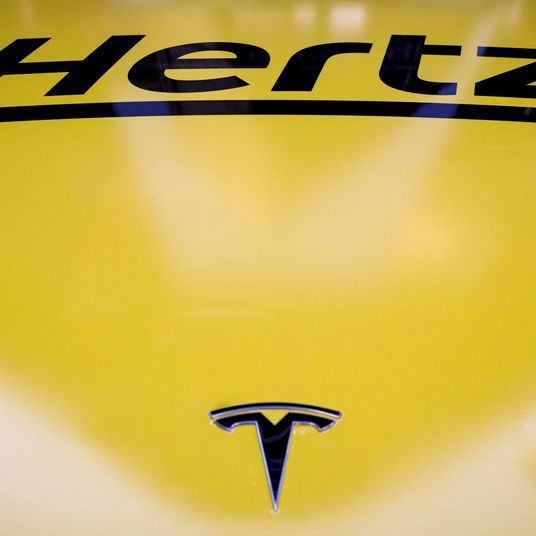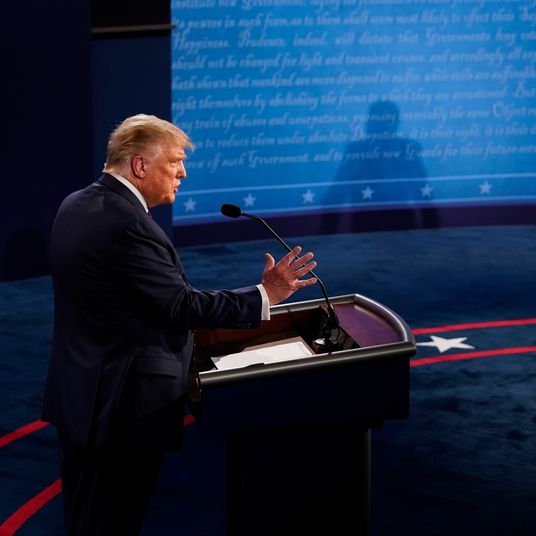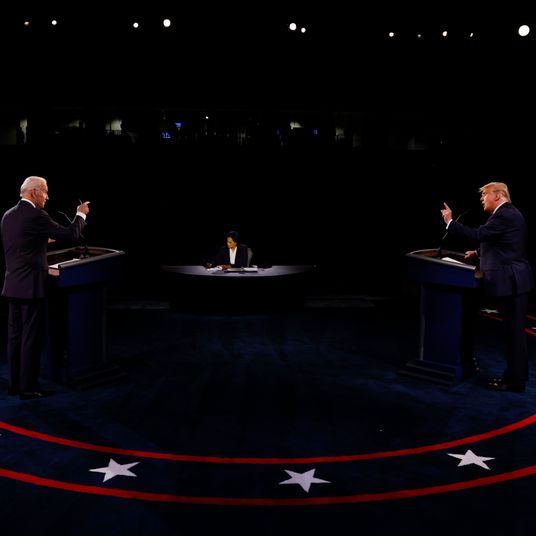
One of Donald Trump’s many idiosyncratic effects on American politics and culture has been to divide Americans not only on the familiar partisan and ideological lines, but to some degree on personal character as well. His entire life, Trump has drawn toward him a wide array of gross, unethical characters, Democratic and Republican alike, while repelling the ethical and upstanding. Since he ran for president, the larger overarching trend toward polarization has masked this smaller effect. But there are plenty of individual instances where Trump’s characterological appeal has come through. One of them is Mark Penn.
Penn, the former adviser to President Clinton and campaign manager for Hillary Clinton in 2008, has very few philosophical reasons to admire Trump. Penn has spent his career urging Democrats to endorse the socially liberal, pro-free trade, pro-immigration, fiscally conservative policy mix favored by upscale, college-educated elites. Trump’s political brand is the precise opposite. But Penn has careerist and personal reasons, having been denied a similar appointment with Clinton after his disastrous 2008 performance. What’s more, Penn is also overtly unethical, and this seems to have overridden any ideological qualms he may be harboring. In Trump he recognizes a kindred soul, or lack of soul, and has churned out a series of relentless propaganda on his behalf.
Penn’s latest paean to the greatness of Trump offers a disturbing window into the vacuous mind of one of the worst people to work in Democratic politics in the last generation. (The only political advisers worse than Penn are Penn’s former partners, Dick Morris and Doug Schoen.) Penn’s thesis is that, despite the predicted wave election he faces Tuesday, Trump has brilliantly outmaneuvered all his enemies. “His political survival after two years in office,” gushes Penn, “is a modern-day miracle.”
Right at the outset, Penn has set the bar so low — “survival” — that anything short of death or impeachment and removal qualifies as a triumph. In fact, Trump’s approval ratings have never sniffed 50 percent, and he is in danger of losing the House majority despite benefiting from a map so ruthlessly gerrymandered in his party’s favor that Democrats need to win the national vote by at least 5 percentage points just to break even.
Penn goes on to credit Trump not only as a political wizard, but as a policy savant who has elevated the level of thought in American politics. Penn’s Trump is a Man of Ideas. Penn notes that while he does not personally agree with Trump’s “idea for ending birthright citizenship,” he praises its substance: “It’s not an insult, a racial epithet, or an off-color joke. It’s an idea that focuses on how an open-borders policy reverberates.”
Note again where Penn has set the bar: Trump has said something that is not a racial epithet, and is instead a proposal. As impressive an achievement as this might sound, Penn neglects to assess anything about this idea. Trump is claiming he will accomplish this idea by negating the plain text of the Constitution with an executive order. Even right-wing legal theorists consider this absurd. He has no other means at his disposal. If a Democratic president claimed they planned to ban all privately owned firearms with an executive order, nobody would be praising them for having at least avoided saying something racist.
Penn proceeds to argue that Trump has formulated a clever synthesis of left and right on immigration policy:
Another Trump idea on immigration is his support for creating a path to citizenship for young people brought to the U.S. illegally as children under the DACA (Deferred Action for Childhood Arrivals) program, in return for three things: a wall on our border with Mexico; an end to the immigration lottery; and a curtailing of chain migration (also known as family reunification) that enables immigrants to bring family members to the U.S.
He does not mention that Democrats endorsed exactly this compromise early this year, and Trump agreed to it before changing his mind and tanking the deal. As a result, Trump is reduced to complaining about how terrible immigration policy is, a suboptimal message for a sitting president.
Penn asserts that Americans mostly approve of Trump’s immigration policy, except for the ghastliest parts that everybody hates: “While Americans strongly oppose splitting up families at the border, in polls they have consistently given majority support to the president’s overall position to restore border security.” In fact, polls have shown plurality disapproval for Trump’s immigration policy, ranging from deficits over 20 points earlier this summer to relatively narrow deficits more recently (a “good” poll for Trump showed him losing by only a 44 to 47 percent margin, thought the margin between strong disapproval and strong approval was higher.)
Penn lambastes Democrats for lacking any of the intellectual energy Trump has displayed for the country:
Other than investigations and impeachment, what are the Democrats running on? They have made an issue of health insurance coverage for pre-existing conditions. Trump has said he too would cover them. The Democratic idea is not a health-care plan, but an attack.
Democrats designed and enacted into law a comprehensive health-care reform that has reduced the uninsured by 20 million. Trump promised to replace it with a better plan that would cover everybody and cost less. He produced a plan not remotely like this, which failed to pass Congress, leaving his party’s actions on health care wildly unpopular. Trump’s work on health care is both a political and a substantive catastrophe. Penn’s attempt to portray it as a success is to complain that Democrats are attacking Trump’s failed and wildly unpopular attempt to repeal their health-care law.
Penn likewise accuses Democrats of lacking “a plan to deal with jobs migrating to China and Mexico.” One might note that Trump’s “plan” is to rebrand NAFTA and launch an unsuccessful trade war with China. But the real point here is that Penn spent the influential portion of his career relentlessly advocating the very trade deals with Mexico and China he now seems to believe cost American workers millions of jobs. Does he have any actual beliefs about trade policy, or does he merely admire the brutal simplicity of Trump’s sloganeering?
Penn concludes by applauding Trump for probably losing just one chamber of Congress in the midterm elections:
It looks like the Democrats will likely win majority control of the House in the midterm elections. So the battle of insults vs. issues may be moot in today’s rough-and-tumble politics. But if the Republicans win more seats in the Senate, that will be a victory compared to what happened in 1994 or 2010.
Well, it’s a “victory” in the sense that Republicans had an overwhelmingly favorable Senate map, forcing Democrats to defend two dozen seats, including ten in states Trump won. Republicans have to defend only one Senate seat in a state Trump lost. In a neutral political environment, Republicans would be poised for massive gains.
Penn concludes by attributing Trump’s alleged triumph to him being “only one candidate really running on detailed issue positions,” which apparently means his wild attack on the media as enemies of the people and attempt to whip his supporters into a panic over a small group of refugees hundreds of miles from the border.
Whether Penn is trying to get himself a job in the Trump administration or merely to curry favor with clients who have business with Trump, is not clear. Either way, the changes Trump has wrought on American politics have favored a certain kind of amoral hack. Mark Penn has never been more at home.






























